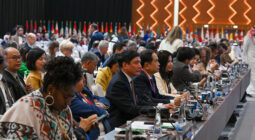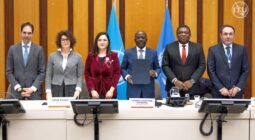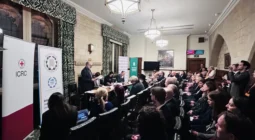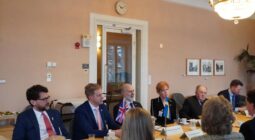

Morocco Speaker visit underscores close relations with UK
The British Group of the Inter-Parliamentary Union (BGIPU) hosted a parliamentary delegation from Morocco from 26 to 30 January 2015. This high level delegation was led by Mr Rachid Talbi Alami MP, Speaker of the House of Representatives and also included Mr Abdellah Bouanou MP, Chair of the Justice and Development Party (PJD) Group; Mrs Milouda Hazeb MP, Chair of the Authenticity and Modernity Party (PAM) Group; Mr Driss Lachgar MP, Chair of the Union of Socialist and Popular Forces Party (USFP) Group; Mr Mohamed Al Ansari MP, Chair of the Independence Party (Istiqlal) Group; Mr Abdelhamid Saadaouii MP, Chair of the Popular Mouvement Party (MP) Group and Mr Khalid Adnoun, PR Advisor to the Speaker.
The delegation arrived in Westminster on 26 January and were warmly welcomed by the Rt Hon Lindsay Hoyle MP, Deputy Speaker of the House of Commons, who gave them an overview of the rich history of Westminster Hall. The delegation then began the formal programme of meetings with an introduction to the UK Parliament by BGIPU Chair the Rt Hon Alistair Burt MP and the Clerk of the Overseas Office of the House of Commons, Mr Crispin Poyser. The Speaker of the Moroccan parliament highlighted the already close relations between our two parliaments and confirmed the delegation’s hopes that this visit would strengthen this relationship. He stated that although his parliament had a proud history of more than 50 years there was still much they could learn from others, and he and his colleagues were keen to introduce a new culture of accountability into their parliament which was something they wished to learn from the Westminster parliamentary system.
The Speaker highlighted the important role that Morocco had to play in trying to achieve stability and economic growth in the Maghreb region. The Speaker noted the issue of Western Sahara posed difficulties for these ambitions and was also closely linked to the trafficking of arms and drugs from Libya as well as dangers related to terrorist activities. He noted that Morocco has worked hard to seek a political solution and wants to respect the Human Rights of people both inside and outside Morocco. Mr Burt said the UK very much supported Morocco’s efforts and he was well aware of the risk of an ungovernable area falling prey to terrorists and supported all parties finding a peaceful resolution of the Western Sahara issue.
Following a welcome lunch hosted by the Lord Speaker, the delegation met Tobias Ellwood MP, Parliamentary Under-Secretary of State at the FCO. The Speaker explained that the new constitution aimed to bringing all the institutions of state together, improving the situation of women and generally working to improve the lives of people in the region. The Minister confirmed that the pace of development should be in line with what works for the country and while the UK had 800 years of experience it was still learning – indeed, our democratic model remained somewhat amorphous and in constant flux. The Speaker key challenges facing Morocco included social cohesion, economic growth and democratic progress, but also since 2011 they needed to address the major challenge of security. Since the collapse of security in Libya, Morocco has been dealing with arms trafficking, as well as drug trafficking from Latin America, through Morocco destined for Europe. Another result of this was the emergence of terrorist groups in the Sahel, funded by the arms and drug trafficking which needed to be addressed, including through approving new terrorism laws.
The Speaker also noted that building a strong Maghreb region was vitally important for Morocco, from an economic point of view, but also from a security point of view meaning resolution of the situation in Western Sahara issue remained a key priority. The Minister confirmed the UK’s strong support for finding a peaceful resolution of the issue. He noted a good relationship with Algeria could be such an advantage to Morocco, allowing the two powerhouses of the region to work together. The last meeting of the day was with Anthony Smith and Dina Melham who outlined the work of the Westminster Foundation for Democracy in Morocco, including a visit of the Deputy Speaker of the Moroccan parliament who would be in London the following week on a visit focussed on the code of conduct of members. The meeting was followed by a reception in Parliament hosted by Her Highness Princess Lalla Joumala, Ambassador of His Majesty the King of Morocco to the United Kingdom.
Tuesday began with a tour of the Palace of Westminster by Meg Munn MP and a meeting with the acting Clerk of the House, David Natzler, who outlined recent discussions on the role of the Clerk in the House of Commons. The delegation confirmed that in their parliament there were in fact two Secretaries General, one dealing with administration and the other in charge of procedural issues. Discussions on the role of House of Commons Commission continued with a detailed description of the role of the Commission by Bob Twigger. A working lunch was held, hosted by Andrew Murrison MP, to engage in exchanges on the importance of efforts to encourage regional Integration in the Maghreb region and the impediments to that goal.
The afternoon session began with a meeting with the Constitution Committee in the Lords, chaired by Lord Lang who together with Baroness Falconer outlined the function of the committee in upholding the UK’s unwritten constitution. The delegation also met with Kathryn Hudson, the Parliamentary Standards Commissioner, who outlined the UK Members Code of Conduct and system for registering Members’ interests which was of interest to the delegation. The Speaker subsequently called on his counterpart, the Rt Hon John Bercow MP, Speaker of the House of Commons, to discuss the importance of maintaining bilateral contacts and exchanges and regarding national and regional developments.
A roundtable meeting with BGIPU members was chaired by BGIPU Vice-Chair, Mike Gapes MP, parliamentarians on both sides recognised the long-standing and mutually beneficial nature of relations between the United Kingdom and Morocco going back many centuries. There continued to be strong people-to-people, cultural and tourism links and educational exchanges between both countries and trade remained a key element of the relationship, further bolstered by Morocco’s key partnership with the EU under the auspices of the European Neighbourhood Policy and the Union for the Mediterranean. Participants on both sides of the discussion recognised common cause between the UK and Morocco in the fight against terrorism and the importance of dealing with radicalisation and extremism. The delegation noted that Morocco has been very active in counter-terrorism efforts domestically and at the international level and all acts of political violence must be condemned whatever its origins.
A major concern from the Moroccan side was that a very small minority were distorting the image of Islam as it was viewed in the wider world – with terrorist perpetrators perhaps amounting to just a few hundred individuals against a global population of 1.5 billion practising Muslims. Moroccan members argued that to effectively address this, there needed to be better understanding of the main reasons and root causes of such extremism including the complex interplay of cultural, social and economic factors. International developments, including the conflict in Syria and instability in Iraq and widespread concern at the plight of the Palestinian people were also factors in rising extremism. This was a global challenge requiring concerted action by all countries to address at the international level but also domestically through effective counter-terrorism laws and policing efforts.
The roundtable also discussed prospects for regional integration in the Maghreb region, noting that progress had been slow and sporadic but the region overall stood to benefit significantly from greater cooperation. The Morocco delegation said a key impediment to progress in regional integration was the dispute over Western Sahara between Morocco and Algeria. They wanted to see greater UK support to resolve this long-standing conflict which had been going on for over 40 year without serious prospects for resolution. The Moroccan delegation regretted that there was continuing obstruction of meaningful dialogue through both bilateral and multilateral channels, including at the UN. They said this situation was holding back the entire region from the economic opportunities which it could enjoy given the negative consequences of this dispute for regional integration and cooperation. UK participants noted the important role Morocco played in addressing drug trafficking through the region, highlighting the increasing incidence of transhipment through North Africa of Latin American drugs destined for Europe. They also provided information on global drug policy reform in advance of UN meetings in 2016. On human rights, there was discussion of Morocco’s approach to the death penalty, noting that while capital punishment still existed, it had not been enacted since 1993. The active participation of women in politics and religion in Morocco was acknowledged as an example to other countries. Overall, Morocco’s political reform efforts and the assistance provided by UK bodies such as the Westminster Foundation for Democracy were also warmly welcomed by both sides.
Following a lively Prime Minister’s Question time and lunch in the Peers Dining room hosted by Lord Harrison, the delegation ended the Westminster Programme with a meeting with Sir Richard Ottaway and members of the Foreign Affairs Committee, including discussions on the role of the Committee and its report on British Foreign Policy and the ‘Arab Spring’.
On Thursday morning the delegation headed to Trowbridge in Somerset and met with Andrew Murrison MP to learn about the agriculture of the area and how Mr Murrison divides his time between Westminster commitments and his constituency. The delegation also met with members of the Moroccan diaspora and the Mayor of Trowbridge. On Friday, the delegation visited the University of Bath for a meeting with Dr Rana Jawad, Coordinator of the MENA Social Policy Network and Lecturer in social policy specialising in the Middle East and North Africa region. During the meeting they discussed the opportunities for cooperation. Dr Jawad discussed the possibility of opening up more exchanges of students with Morocco. The final event of the programme was a lively and informative lunch with Don Foster, MP for Bath, who gave a detailed account of the important role of the Whip in the Westminster system.













